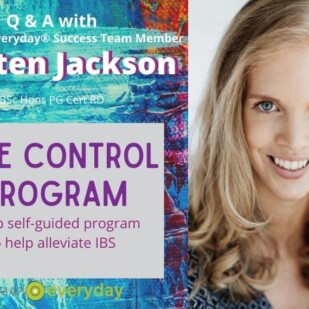If you are not aware of our Success Team as of yet, take a glance at our Team Page to see all of the fabulous RDs that make up FODMAP Everyday®; they bring you the expert, evidence-based articles and advice that you are looking for. You can find Julia’s professional bio here.

We strive to bring you a balance of expertise and are thrilled to introduce Julia Celestini RD, an Ontario, Canada based dietitian who offers individual and family nutrition counselling in the Greater Toronto Area and provides virtual services across most Canadian provinces. She is Monash University trained in the low FODMAP diet and we sat down with her to talk shop.
Dédé Wilson: Julia, welcome aboard! For those you don’t realize, gastrointestinal issues can occur with children and even babies. And of course, those kids live in families with one or more adults, so helping a family with these medical problems takes special education and finesse. Tell us a bit about your dietetic internship at SickKids, and what that organization is.
Julia Celestini: Thank you Dédé for the warm welcome – I am so excited to a part of this incredible team!
My dietetic internship at SickKids (short for the Hospital for Sick Children) was an invaluable experience and had a profound impact on the way I view the world and my role as health care provider.
SickKids is a world-leading pediatric hospital in Toronto, Ontario. It is the most research-intensive hospital and largest pediatric center in Canada. Professionals from around the world travel to SickKids to learn about innovative research and world-class care at SickKids to better serve children in their communities.
The dietetic internship I completed at SickKids is the only exclusively pediatric-focused internship in Canada. It was incredible to learn from experts in the pediatric world and be able to make an impact on the lives of the wonderful children and the families I worked with.
Throughout the year I completed intensive clinical rotations in a wide variety of areas including hematology/oncology, general pediatrics, genetics and metabolics, GIFT (Group for Improvement of Intestinal Function and Treatment) and cardiac critical care.
My interest in gastrointestinal (GI) health was sparked after my rotation in GIFT working with children with intestinal failure and complex nutritional needs. It was during this rotation that I realized the role of diet therapy as a primary treatment option and the true potential of nutrition to positively impact the lives of children.
They told us when we arrived at SickKids that once you start in pediatrics you won’t go back, and they were right!
Did you first learn of the low FODMAP diet in school, or during this internship?
I first learned about the low FODMAP diet during my undergraduate degree in Nutrition & Dietetics. We discussed it in my clinical nutrition class when I learned about therapeutic diets for different health conditions. I remember having a very hard time remembering which foods were high and low FODMAP and what the FODMAP acronym stood for – if only I knew about the Monash app back then! Since then, I have learned far more about the FODMAP diet and have been able to use it with many clients I work with to their benefit.
They didn’t guide you to the Monash app in your class? That was unfortunate. What is it about working with children and their caregivers that excites you?
What excites me about working with children, specifically in the gastrointestinal health space, is how profoundly nutrition therapy can improve their day to day lives and ultimately change their future. Hearing feedback from the families I work with about the impact nutritional therapy has on their quality of life is incredible and motivates me to continue to do what I am doing so I can help more children.
For example, many children before coming to see me or a gastroenterologist may not be able to stay at school the entire day because of severe abdominal pain or incontinence (soiling). Targeted dietary and lifestyle interventions help to manage their gastrointestinal symptoms, allowing children to stay at school the entire day, being able to play with their friends, and reducing significant stress in their day-to-day lives.
Children have so much potential and even if I can play a small role in helping make their childhood a more positive experience, I have done my job.
Also, the reaction every time I show a child the Bristol stool scale is priceless!
LOL they get to talk about poop! That must make you a popular adult. You started your private practice in 2019 and along with IBS you specialize in IBD, SIBO, celiac, gluten-sensitivity and infant and childhood food allergies and intolerances, among other medical diagnoses. Can you talk a little bit about IBS in children and also childhood food allergies and intolerances? I know we have many community members who are dealing with these issues. What is particular about these younger age groups?
Absolutely! When it comes to childhood nutrition there is a lot to consider.
Growth and development is a priority for all of my patients and needs to be monitored closely by professionals with pediatric experience so that necessary changes can be made to ensure children are well-nourished, thriving and growing to their fullest potential.
Getting to the root cause of gastrointestinal symptoms or concerns is crucial before changes should be made. This is usually done in a team setting so a child can see all necessary specialists who can take a holistic view of the child and help families understand what the root cause of the problem is and what the best course of action may be.
Another thing to consider is that children are highly influenced by the world around them and their early experiences with food shape their later relationship with food. I am always cognizant of this and ensure in working with a child and their family that we are always supporting the development of a positive relationship with food.
Of course, sometimes limiting or avoiding certain foods is medically necessary, and appropriate non-food related strategies should be trialed first. A key role I play as a dietitian for children with dietary restrictions is to ensure nutrients are replaced adequately to prevent nutritional deficiencies and ensure optimal growth and development.
My biggest piece of advice to families with a child with a gastrointestinal condition is to work with a pediatric Registered Dietitian and pediatric gastroenterologist and/or allergist. Individualized care and support is important because every child is so unique!
Are there any particular issues that you see more often than not when it comes to pediatric GI issues?
An issue that arises is specific dietary patterns being blamed for GI discomfort when the underlying issue may be elsewhere. In these instances, food elimination and restriction could actually do more harm than good. For example, a lot of children with bloating may actually have constipation from a lack of fiber and fluid or altered gut motility.
Decreasing high FODMAP fruits and veggies may actually worsen constipation and therefore increase bloating and discomfort. In a case of constipation, I may recommend reintroducing osmotic FODMAPs that help pull in water to (ex. sorbitol and mannitol) to help soften stools and ensure adequate fiber and fluid intake instead of recommending a low FODMAP diet.
As we discussed previously, is crucial to get to the root cause of the gastrointestinal symptoms and have a targeted strategy to ensure children are having symptom relief as soon as possible without unnecessary dietary elimination.

Read Julia’s Article on Elimination Diets and Children
Of course, we are always reminding people that they should be undertaking the low FODMAP diet along with a RD, but is there any way you can generally explain how this diet can be applied to children? Like, are there age groups that you create and approach each differently? I would imagine a 2-year old has different needs than a 10-year old. For instance, we know the recommended low FODMAP servings on the Monash app are geared towards adults.
Great question, there is very limited research on the low FODMAP diet in children with irritable bowel syndrome (IBS) and it should be individualized for each child by a Registered Dietitian depending on their developmental stage, physical maturity, relationship with food and food skills.
IBS is also typically only diagnosed once children can reliably communicate their symptoms, usually in early school years (about 4 years and up).
In general, for all age groups, I try and limit dietary restriction as much as possible. For children with IBS of any age, I encourage trialing non-dietary-related strategies first such as gut-directed hypnotherapy. If the low FODMAP diet is indicated, after an assessment by myself and a gastroenterologist I often recommend a simplified low FODMAP diet, in which only foods very high in FODMAPs are reduced.
I provide a tailored list to families of only very high FODMAP foods and we may not use the Monash app at all. I try not to give specific portions to families (especially with younger children) because in my opinion, it can negatively impact their relationship with food. Instead, I stress having a balance of food groups at each meal (which is recommended for adults as well). Ensuring younger children are spacing out foods groups throughout the day and getting an appropriate balance of all food groups at each meal helps to reduce the FODMAP load and helps manage symptoms.
For older children and teens (I typically say post-puberty as a general rule of thumb) I may recommend they use the Monash app for food choices, unless I believe a simplified approach would be better suited.
In terms of portions for adults vs. children, I incorporate intuitive eating (which most children are great at naturally), which essentially means having them tune into their bodies natural hunger and fullness cues. I find if children and teens are natural intuitive eaters, they are less likely to experience overeating or FODMAP stacking.
It is also important to have a dietitian monitor a child’s growth very closely when making any dietary change to ensure they are getting enough energy to grow optimally, and necessary changes can be made as needed to prevent malnutrition and nutritional deficits.
If someone is looking for a pediatric GI, are there any organizations or websites that can be of help?
In Canada, families can ask for a referral to a pediatric GI directly. Having a pediatric GI is a great asset to your child’s medical team. Additionally, most hospitals have outpatient GI clinics depending on the child’s needs. Additional resources for general information for different gastrointestinal conditions I find recommend for families include:
- Canadian Celiac Association
- FPIES Foundation
- Canadian Digestive Health Foundation
- About Kids GI
- GI Kids
- About Kids Health
In your bio you mention that HOW you eat is as important as what you eat. Can you tell us more about that?
Absolutely! I am a firm believer in intuitive eating for everyone especially when it comes to managing gastrointestinal symptoms. It is important to be present at mealtimes, which means slowing down, reducing distractions, taking time to eat and trying to relax to optimize digestion.
When we are present at meals and eat intuitively we ensure we eat the right amount of food for our body (not too much or too little) because our brain can connect to our stomachs stretch receptors to recognize fullness, we are more likely to chew our food thoroughly and we reduce stress levels which all contribute to optimal digestion.
Balancing what you eat and how you eat can optimize digestion and help reduce digestive symptoms.
On your website you talk about your interest in supporting a diet that is based upon whole, unprocessed foods – and that is what FODMAP Everyday® is all about. We, too, are interested in showing folks how they can make delicious low FODMAP, IBS friendly food at home. Conversely, we see again and again how hard the low FODMAP diet can be for people who have largely been eating processed and packaged foods. When you have patients like this, how do you help guide them within the low FODMAP diet?
What you describe is a challenge for so many people when incorporating the low FODMAP diet. To help with this challenge, I try to make the low FODMAP diet as realistic as possible for families. I start by asking them how much they cook at home and how comfortable they are making changes to their current diet. Depending on how often they cook at home, I often look up local places they shop and like to eat out. From there I recommend grab and go items (such as FODY Foods products and GoMacro bars) in addition to foods they can eat out. I also create simple customized meal plans for families if needed which helps take the stress out of planning.
I often find this diet positively encourages people to go outside their comfort zones and try new foods which is awesome, but it is great to have simple and easy options when getting started as it is a huge change!
And tell us about your breathing tip. It seems crazy that we have to remind ourselves to breathe, but we do!
This is my favorite tip because it is simple and you can do it anywhere – at work, traveling, school or wherever you may be!
Relaxation techniques can be effective in managing symptoms of IBS. Incorporating stress management and mindfulness activities daily can be a part of both self-care and symptom management. This strategy is based on the way the brain and digestive system communicate and interact with each other, otherwise known as the brain-gut connection or gut-brain axis.
The idea with deep breaths before meals is to help get into a mindful and calm state before eating (a component of intuitive eating as we discussed previously). You simply take 3 big deep breaths before each meal and snack and try to forget about any stressors that might be impacting your day. Ideally, you can implement diaphragmatic or abdominal breathing which is a deep breathing technique. I try to do this as much as I can and encourage my patients to do the same – it works really well with kids as the family can do it together.
Julia, thank you so much for this chat. We are thrilled to be able to introduce you as part of our Success team.
Julia offers a free discovery phone call for prospective clients.








